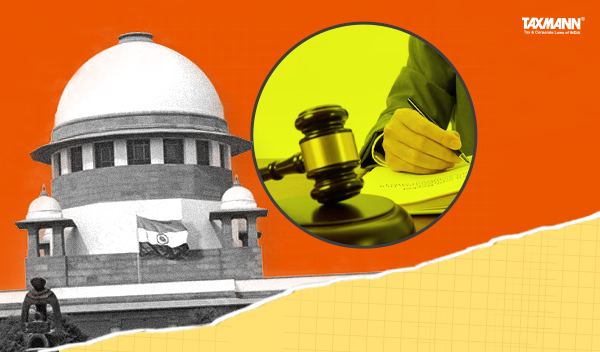HC Finds No Merit in Sec. 34 Plea as Arbitral Tribunal’s ‘Nil’ Award Rendered Claims Irrelevant After-Tax Demand Quash
- Blog|News|Company Law|
- 2 Min Read
- By Taxmann
- |
- Last Updated on 14 November, 2024

Case Details: Naresh Kumar Bajaj v. Bunge India (P.) Ltd. - [2024] 168 taxmann.com 139 (HC-Delhi)
Judiciary and Counsel Details
- Neena Bansal Krishna, J.
-
Dhruv Mehta, Sr. Adv., Anubhav Ray, Ms Gayatri Verma & Abhishek, Advs. for the Petitioner.
-
Saket Singh, Sr. Adv. & Sameer Patel, Adv. for the Respondent.
Facts of the Case
In the instant case, the petitioners entered into a Non-Compete Agreement (NCA) and Business Transfer Agreement (BTA) with the respondent. They sought a finding on the interpretation of the said agreements to determine contractual obligations, viz indirect tax (service tax) liability, and for payment of damages constituted as costs incurred by the petitioner in defending the assessment order. As per the said agreements, the entire responsibility for these costs rests with the respondent.
However, the Arbitral Tribunal passed a ‘Nil’ award on the ground that in view of the demand itself having been quashed, the exercise of adjudicating upon claims of petitioners had become academic.
The petitioners filed an instant petition under section 34 of the Arbitration and Conciliation Act, 1996, to challenge the said award.
High Court Held
The High Court noted that since in Agreement it was specifically mentioned that service Tax was not leviable on NCA fees, for erroneous acts of third party, respondent could definitely not be held liable for costs incurred in defending Notices before CESTAT.
The High Court held that the grounds agitated by the petitioners did not fall in either of categories of patent illegality or fundamental breach of Indian Law. Thus, there being no merit in petition filed under section 34, the same was to be dismissed.
List of Cases Referred to
- Rashlriya Ispat Nigam Ltd. v. Dewan Chand Ram Saran (2012) 5 SCC 306 (para 43)
- Kedarnath Jute Mfg. Co. Ltd. v. The CIT (Central) Calcutta (1972) 3 SCC 252 (para 43)
- Deccan Paper Mills Company Limited v. Regency Mahavir Properties and others (2021) 4 SCC 786 (para 44)
- Bharat Coking Coal Ltd. v. Annapurna Construction (2003) 8 SCC 1543 (para 45)
- MD, Army Welfare Housing Organization v. Sumangal Services (P) Ltd. (2004) 9 SCC 619 (para 45)
- Hindustan Zinc Limited v. Friends Coal Carbonization (2006) 4 SCC 445 (para 46)
- Associate Builders v. DDA (2015) 3 SCC 49 (para 46)
- Ssanyong Engineering & Construction Co. Ltd. v. NHAI (2019) 15 SCC 131 (para 46)
- Benarsi Krishna Committee & Ors. v. Karmyogi Shelters Pvt. Ltd. (2012) 9 SCC 496 (para 47)
- Associate Builders (supra); State of Goa v. Praveen Enterprises (2012) 12 SCC 581 (para 49)
- P.H. Pandian v. P. Veldurai & Anr. (2013) 14 SCC 685 (para 50)
- Harsharan Verma v. Charan Singh & Ors. (1985) 1 SCC 162 (para 50)
- Central Areca Nut & Cocoa Marketing & Processing Cooperative Ltd. v. State of Karnataka & Ors. (1997) 8 SCC 31 (para 50)
- K.N. Rajakumar v. V. Nagarajan and Ors. (2022) 4 SCC 617 (para 50)
- Reliance was also placed on Life Insurance Corporation of India and Anr. v. Ram Pal Singhy Bisen (2010) 4 SCC 491 (para 50)
- MMTC Limited v. Vedanta Ltd, (2019) 4 SCC 163 (para 69)
- ONGC v. Saw Pipes 2003 (5) SCC 705 (para 69)
- Hindustan Zinc Limited v. Friends Coal Carbonisation (2006) 4 SCC 445 (para 70).
Disclaimer: The content/information published on the website is only for general information of the user and shall not be construed as legal advice. While the Taxmann has exercised reasonable efforts to ensure the veracity of information/content published, Taxmann shall be under no liability in any manner whatsoever for incorrect information, if any.

Taxmann Publications has a dedicated in-house Research & Editorial Team. This team consists of a team of Chartered Accountants, Company Secretaries, and Lawyers. This team works under the guidance and supervision of editor-in-chief Mr Rakesh Bhargava.
The Research and Editorial Team is responsible for developing reliable and accurate content for the readers. The team follows the six-sigma approach to achieve the benchmark of zero error in its publications and research platforms. The team ensures that the following publication guidelines are thoroughly followed while developing the content:
- The statutory material is obtained only from the authorized and reliable sources
- All the latest developments in the judicial and legislative fields are covered
- Prepare the analytical write-ups on current, controversial, and important issues to help the readers to understand the concept and its implications
- Every content published by Taxmann is complete, accurate and lucid
- All evidence-based statements are supported with proper reference to Section, Circular No., Notification No. or citations
- The golden rules of grammar, style and consistency are thoroughly followed
- Font and size that’s easy to read and remain consistent across all imprint and digital publications are applied



 CA | CS | CMA
CA | CS | CMA
